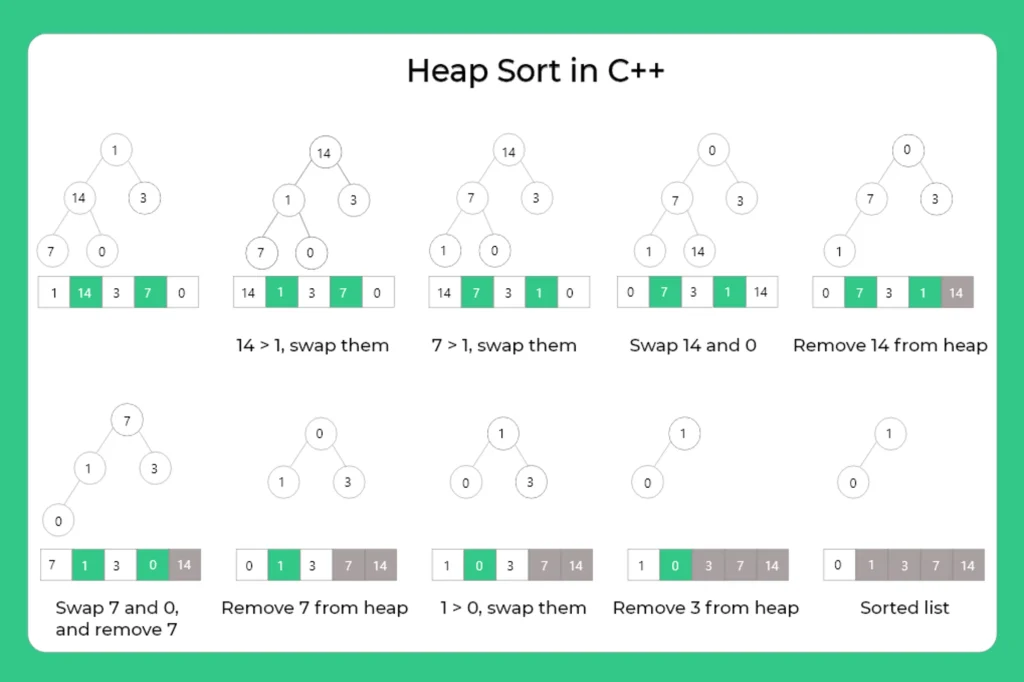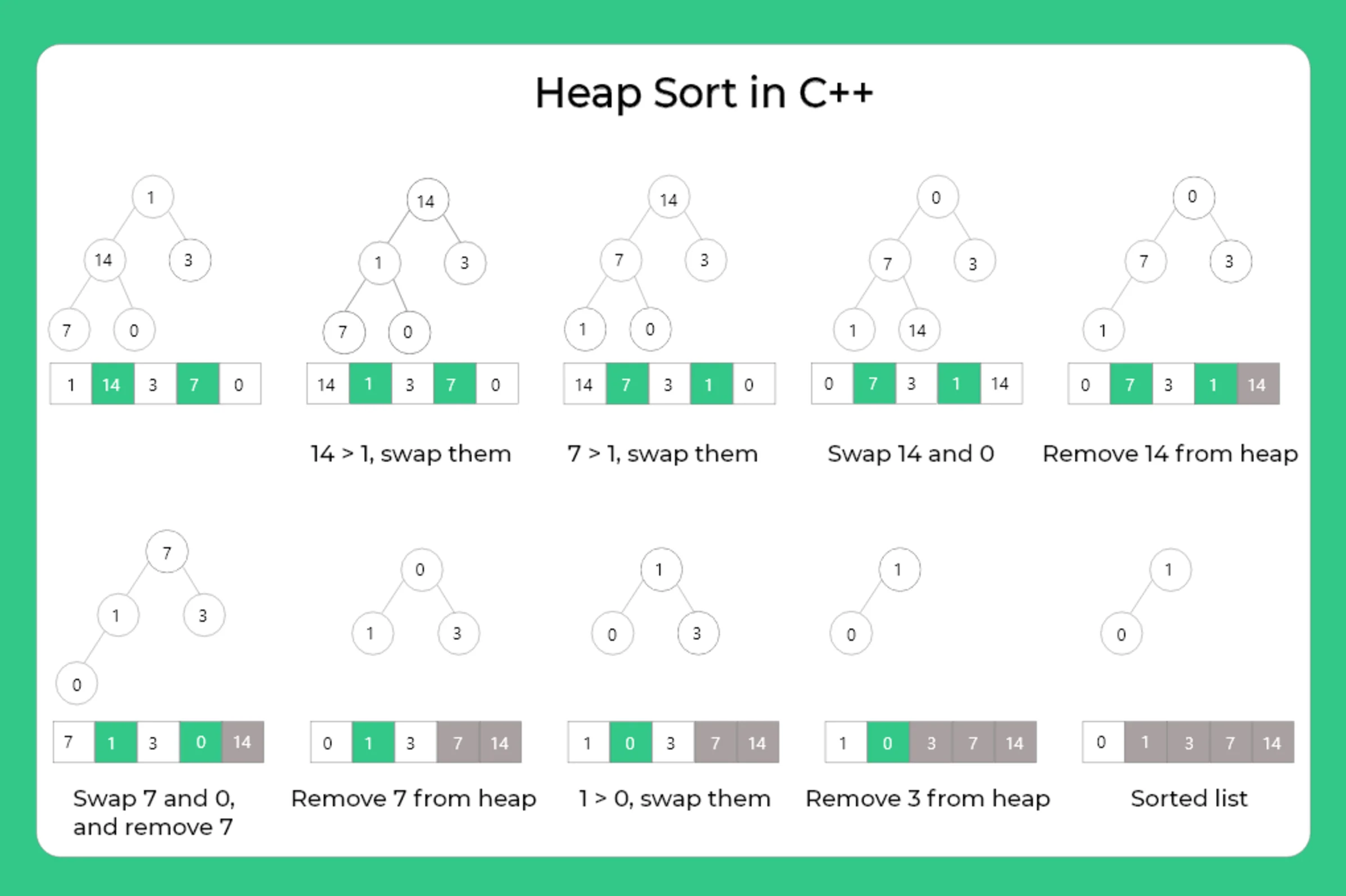Heap Sort in C++
What is heap sort in C++?
Heap Sort in C++ – A heap is a complete binary tree which is represented using array or sequential representation. It is one of the efficient algorithm for sorting given data in logical order.
In this sorting algorithm a tree structure called heap is used where a heap is a type of binary tree. An ordered balanced binary tree is called a Min-heap, where the value at the root of any subtree is less than or equal to the value of either of its children. An ordered balanced binary tree is called a max heap where the value at the root of any subtree is more than or equal to the value of either of its children. In this article, we will learn more about heap sort in C++

What is heap sort in C++?
A heap is a complete binary tree which is represented using array or sequential representation. It is one of the efficient algorithm for sorting given data in logical order.
In this sorting algorithm a tree structure called heap is used where a heap is a type of binary tree. An ordered balanced binary tree is called a Min-heap, where the value at the root of any subtree is less than or equal to the value of either of its children. An ordered balanced binary tree is called a max heap where the value at the root of any subtree is more than or equal to the value of either of its children. In this article, we will learn more about heap sort in C++
Working of heap sort in C++
To sort any list into a logical order following steps are followed :-
- Convert the list into heap.
- Now convert this heap into max heap.
- As the heap is converted to max heap largest element in the list is stored in the root of the heap, replace it with the last item of the heap.
- Now delete this node and reduce the size of heap by 1.
- Follow these steps until the list is sorted.
How to convert given list into heap ?
Let say, the index of any element in the list is i, the element in the index 2i+1 will become the left child and element in 2i+2 index will become the right child. And we want to find out the parent of any element then we can find it by finding the lower bound which is given by (i-1)/2 .


Prime Course Trailer
Related Banners
Get PrepInsta Prime & get Access to all 200+ courses offered by PrepInsta in One Subscription
Algorithm for heap sort in C++
MAX-HEAPIFY(A,i)
1- i<-left[i]
2- r<-right[i]
3- if l<heap-size[A]and A[l]>A[i]
4- then largest<-1
5- else largest<-i
6- if r<heap-size[A] and A[r]>A[largest]
7- then largest<-r
8- if largest!=i
9- then exchange A[i]<->A[largest]
10- MAX-HEAPIFY[A,largest]
HEAP-SORT(A)
1- BUILD-MAX-HEAP(A)
2- for i<-length[A] down to 2
3- do exchange A[1]<-> heap-size[A]-1
4- heap-size[A]<-heap-size[A]-1
5- MAX-HEAPIFY(A,1)
BUILD-MAX-HEAP(A)
1- heap-size[A]<-length[A]
2- for i<-(length[A]/2) down to 1 do
3- MAX-HEAPIFY(A,i)
Program for heap sort in C++
#include<iostream>
using namespace std;
void heapify(int arr[], int n, int i)
{
int largest = i;
int l = 2*i + 1;
int r = 2*i + 2;
//If left child is larger than root
if (l < n && arr[l] > arr[largest])
largest = l;
//If right child largest
if (r < n && arr[r] > arr[largest])
largest = r;
//If root is nor largest
if (largest != i)
{
swap(arr[i], arr[largest]);
//Recursively heapifying the sub-tree
heapify(arr, n, largest);
}
}
void heapSort(int arr[], int n)
{
for (int i = n / 2 - 1; i >= 0; i--)
heapify(arr, n, i);
//One by one extract an element from heap
for (int i=n-1; i>=0; i--)
{
//Moving current root to end
swap(arr[0], arr[i]);
//Calling max heapify on the reduced heap
heapify(arr, i, 0);
}
}
//Function to print array
void display(int arr[], int n)
{
for (int i = 0; i < n; i++)
{
cout << arr[i] << "\t";
}
cout << "\n";
}
int main()
{
int arr[] = {1, 14, 3, 7, 0};
int n = sizeof(arr)/sizeof(arr[0]);
cout << "Unsorted array \n";
display(arr, n);
heapSort(arr, n);
cout << "Sorted array \n";
display(arr, n);
}Output:
Unsorted array 1 14 3 7 0 Sorted array 0 1 3 7 14
Explanation:
- The heapify function ensures a subtree rooted at index i satisfies the max-heap property by comparing the root with its left and right children and swapping if needed, then recursively fixing the affected subtree.
- heapSort first builds a max-heap from the array by calling heapify on all non-leaf nodes starting from the middle.
- After building the heap, it repeatedly swaps the root (largest element) with the last element and reduces the heap size, effectively placing the largest elements at the end.
- Each time the root is swapped, heapify is called to restore the max-heap property in the reduced heap.
- The display function prints the array before and after sorting to show the effect of the heap sort algorithm.
Time and Space Complexity for Heap Sort in C++
Time Complexity of Heap Sort
Heap Sort works by first building a max heap from the input, then repeatedly removing the largest element and placing it at the end of the array.
Let n be the number of elements.
- Best Case: O(n log n)
Even if the array is already sorted, Heap Sort still builds a heap and sorts all elements. - Average Case: O(n log n)
On average, it takes log n time to adjust the heap for each of the n elements. - Worst Case: O(n log n)
Even in the worst case, Heap Sort performs log n operations for each element.
Space Complexity of Heap Sort
Heap Sort is an in-place algorithm, which means it does not use extra space for sorting (other than a few variables).
- Space Complexity: O(1)
It sorts the array using constant extra space.
FAQs
Heap Sort first builds a max-heap from the array, then repeatedly swaps the root with the last element and reduces heap size to sort the array.
Heap Sort guarantees O(n log n) time complexity, works in-place, and doesn’t require additional memory like Merge Sort.
Heap Sort is preferred when memory usage needs to be minimal and predictable time complexity is required, even for large datasets.
A Max-Heap ensures the largest element is at the root, while a Min-Heap keeps the smallest element at the root; Heap Sort typically uses a Max-Heap to sort in ascending order.
Get over 200+ course One Subscription
Courses like AI/ML, Cloud Computing, Ethical Hacking, C, C++, Java, Python, DSA (All Languages), Competitive Coding (All Languages), TCS, Infosys, Wipro, Amazon, DBMS, SQL and others




Login/Signup to comment